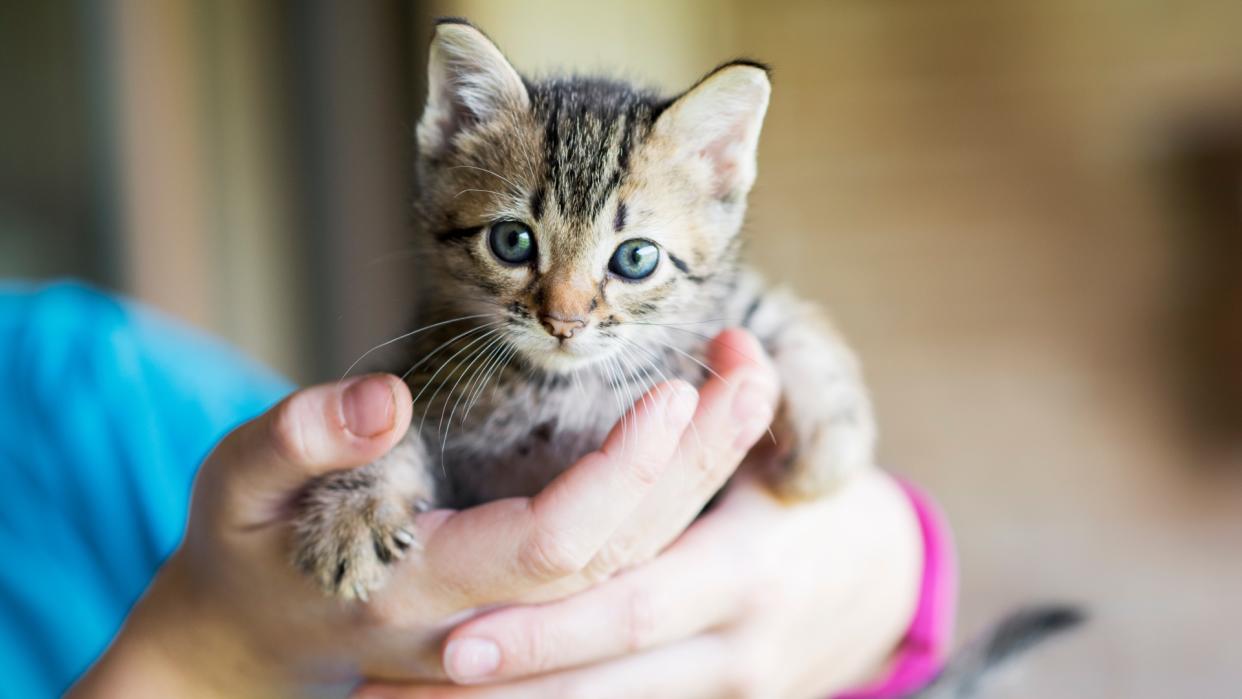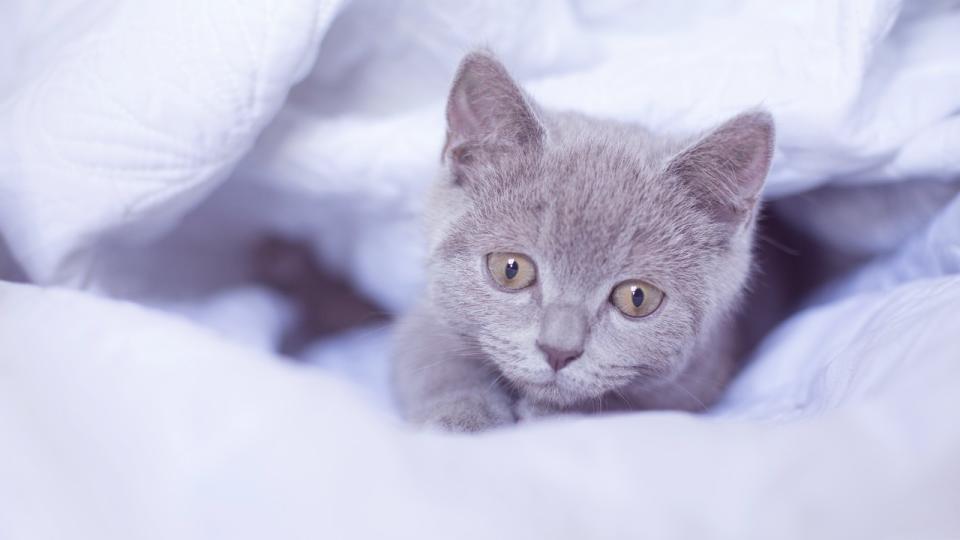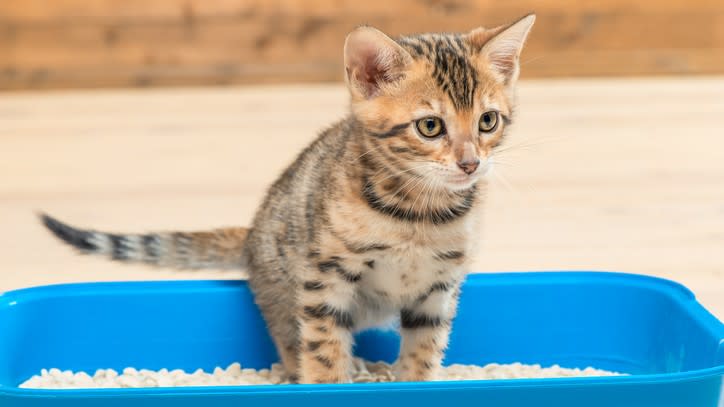Kitten constipation: Vet reveals how to help your feline friend poop

Worried about kitten constipation? If you’ve noticed your little fur friend isn’t pooping as frequently as they once were or they’ve stopped producing stools altogether, you may be wondering what’s going on.
Kitten constipation can occur for any number of reasons. It could be that your kitten isn’t drinking enough water and is dehydrated or they have an intestinal parasite that’s blocking the movement of feces through the intestines. The best kitten food may also be a culprit if there’s something in the ingredient list that doesn’t agree with your kitty’s delicate digestive system.
Just like diarrhea in cats, you’ll want to pay attention if you have a constipated kitten on your hands. If your little one is defecating less than usual but is showing no other signs of illness, you may be able to resolve their constipation at home.
We understand how easy it can be to worry when your little one is unwell, so to help you figure out whether your kitten needs a trip to the vet, we spoke to Dr. Catherine Barnette. Below, she explains the symptoms of constipation, the most common causes, what you can do to prevent it and when it’s time to seek medical attention. Plus, Dr. Hannah Godfrey shares her thoughts on the fastest way to relieve kitten constipation and how you can stimulate your kitten's bowels at home.
Symptoms of kitten constipation
It’s not uncommon for young kittens to have slightly irregular bowel habits. You may not find feces in your kitten’s litter box every single day, and this doesn’t always mean that there is a problem. However, it’s important to be able to recognize constipation when it does occur, so you can address the problem before it becomes too serious.
In addition a lack of feces, other signs of constipation in kittens may include:
Lethargy
Decreased appetite
Vomiting
Straining to defecate
Vocalizing in the litter box
Accidents outside the litter box
If you are bottle-feeding a very young or newborn kitten, you will need to stimulate your kitten to defecate. Kittens under one month old are stimulated when their mother licks the area around their anus, and you can create a similar effect by stimulating your kitten with a moist, warm washcloth. You should stimulate your kitten before every feeding, and they should produce a small amount of stool. If your kitten has gone several feedings without defecating, this suggests possible constipation.
Finally, some constipated kittens can still produce small amounts of feces. Small amounts of liquid feces may be able to pass around a large ball of dried feces that is trapped within the colon. If your kitten seems to be having trouble defecating, even if they are still passing small amounts of stool, they could potentially be constipated.
Causes of kitten constipation

Dehydration in cats is a common cause of constipation. Without adequate water intake, kittens can become dehydrated. In an effort to remain hydrated, they will reabsorb large amounts of water from their stool. Dry stool cannot be moved through the intestinal tract as effectively, leading to constipation.
An improper diet can also be associated with constipation, if the diet leads to stool that is difficult to transport through the intestines. Heavy intestinal parasite infections can block the movement of feces through the intestines, as can foreign body obstructions (a toy or string lodged in the intestines).
Less commonly, birth defects can make it difficult or impossible for a kitten to defecate, leading to constipation. In atresia ani, for example, kittens are born without an anus and therefore they are unable to defecate.
Treating kitten constipation at home
If your kitten is defecating less often than usual, but otherwise acting normal (eating, playing, and active), you can attempt basic home care.
First, ensure that your kitten is receiving plenty of water. If your kitten eats dry food, feed a canned diet or add water to your kitten’s food. In many cases, boosting your kitten’s fluid intake is all that’s needed to alleviate mild constipation.
Avoid giving your young feline milk because then you'll be trying to figure out how to help a kitten with diarrhea — the opposite issue to what you're facing at the moment.
Unless your cat is under a month old, you should not need to stimulate your cat to defecate. However, a gentle belly rub or vigorous play session can sometimes help trigger a bowel movement.
How do you stimulate a kitten’s bowels?
"Depending on your kitten’s age and whether they are weaned, high-fiber foods can be given to draw water into your kitten's guts and help the poop move through," explains Godfrey. "However, this will only help if your kitten is very well-hydrated and continues to drink well, otherwise, it could make the problem worse. Therefore, if you think your kitten is constipated, it's a good idea to speak to your vet about using lactulose, which helps to lubricate the feces.
It’s also worth noting that very young kittens need to be stimulated to pass poop. This is usually done by their mother who licks their rear end to help them toilet. However, if you are handrearing a kitten you may need to stimulate their bowels by rubbing wet cotton wool on their rear end from their belly to their tail."
What is the fastest way to relieve constipation in a kitten?
"Firstly, if your kitten hasn’t passed feces for a few days and is straining, distressed, or unwell, or if there’s a chance they’ve eaten something inedible that could have caused a gut blockage, it’s best to take them to the veterinary clinic for an appointment," Godfrey advises.
"The veterinarian can assess the extent of the constipation and decide whether they need oral treatment like lactulose, a drip to rehydrate them, or an enema. If your kitten is still passing feces but the feces is firm or they’re just not passing feces as easily or regularly, increasing their water intake via a water fountain or adding water to their food could help. This is because the guts are not well lubricated if your cat isn’t well hydrated."
When to see a veterinarian

If your kitten is lethargic, reluctant to eat, or vomiting, you need to see a veterinarian — this is one of the most important kitten care tips we can share with you. Constipation is often associated with dehydration; left untreated, this can be very serious for your kitten. Additionally, untreated constipation can permanently stretch your kitten’s colon, making your cat more prone to future bouts of constipation.
Your veterinarian will begin by performing a thorough physical exam, taking special care to palpate your kitten’s abdomen and feel for signs of feces accumulation. A fecal parasite examination may be performed to look for intestinal worms, and abdominal radiographs (x-rays) may be taken to assess the amount of feces present in your kitten’s colon. Your veterinarian may also recommend bloodwork or other tests, especially if your kitten appears seriously ill.
What do vets give cats for constipation?
Many cases of constipation are caused by dehydration. If your veterinarian feels that dehydration is causing your kitten’s constipation, they may administer intravenous (IV) or subcutaneous (under the skin) fluids to rehydrate your kitten. Fluid therapy alone may be adequate to help your kitten’s bowel movements return to normal.
Your veterinarian may also prescribe a laxative for your kitten. These medications are designed to help feces move through the digestive tract and be eliminated. In more severe cases, an enema may also be recommended, which may be performed under sedation or anesthesia.
Preventing constipation in kittens
Preventing constipation in kittens is largely focused on ensuring that you are feeding an appropriate diet and providing adequate amounts of water. If your kitten has had episodes of constipation in the past, feeding a high-moisture canned diet may prevent future problems. You can also add a small amount of water to your kitten’s food, in order to increase the moisture content of the diet.
Your veterinarian may also recommend a high-fiber diet, to increase the bulk of your kitten’s feces. In some cases, small amounts of canned pumpkin or other high-fiber additives may be recommended.
While you may be able to treat a mildly constipated kitten with home care, severe cases require veterinary attention. Ensure that your kitten is receiving adequate water; if necessary, you can feed a canned diet with water added. If your kitten does not respond to a diet change or shows other signs of illness, contact your veterinarian.
Enjoy this piece and looking for more great kitty content? The be sure to check out our guide to how to litter train a kitten.
